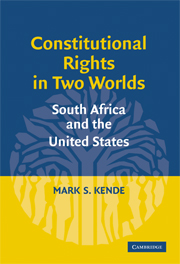‘This book provides a perceptive examination and critique of important areas of the jurisprudence of the South African Constitutional Court. Professor Kende uses the South African decisions as a prism for examining the case law of courts of other democratic nations and especially the United States Supreme Court. It provides important new insights into many areas of concern to scholars, judges, practitioners and students.’
Richard J. Goldstone - Former Justice of the South African Constitutional Court
‘A fascinating, original, and genuinely important book, illuminating not only the South African and American Constitutions, but constitutional theory and practice in general. Indispensable reading.’
Cass R. Sunstein - Felix Frankfurter Professor of Law, Harvard Law School
‘Mark Kende's book is an outstanding and refreshing contribution to the growing literature on comparative constitutionalism. His profound analyses of the fascinating South African constitutional project, and the crosscultural juxtaposition of its constitutional rights jurisprudence and the US constitutional practices reflect the challenges of modern day constitutionalism. Kende's approach of 'transformational constitutionalism with a pragmatic touch' will revive the rusty discourse on US constitutionalism, and his conclusions form a sound basis for a comprehensive and progressive reform agenda.’
Dr. Rainer Nickel - Institut für Öffentliches Recht/Institute for Public Law, Goethe-Universität Frankfurt am Main and Former Schlesinger Scholar and Visiting Professor at Cornell Law School
‘Written in clear and persuasive prose, Mark Kende's very compelling narrative raises provocative questions about the role of constitutions and courts to effect social and political change. His thoughtful comparative analysis of the rights provisions in the South African and American constitutional frameworks provides the reader with a novel perspective by which to examine contemporary constitutional issues like religion, social and economic rights, and gay marriage. As Kende points out, although there are marked differences, the United States and South Africa have a shared history of racial segregation and tyranny, which both societies have endeavored to overcome through constitutional mechanisms, including an innovative constitutional jurisprudence. Drawing on his impressive knowledge of both constitutional systems, Kende highlights the possibilities and the limitations that constitutions can generate regarding structural societal change. American constitutional law has spawned an extraordinary volume of scholarly works, and a significant literature on the South African Constitution has emerged since the first constitution was adopted there in 1993. Kende's volume is the first to provide a detailed comparative perspective, highlighting differences and similarities that will be of tremendous value to public law, comparative constitutional law, and international human rights scholars.’
Penelope Andrews - Professor of Law and Director of International Programs, Valparaiso University School of Law
‘Discusses the South African Constitutional Court's rulings abolishing the death penalty …’
Source: The Chronicle of Higher Education
'Constitutional Rights in Two Worlds: South Africa and the United States is a rich addition to legal commentary on comparative constitutionalism … it furthers the case for the development of progressive constitutionalism and enhances the value of international human rights law.'
Source: Commonwealth Law Bulletin



